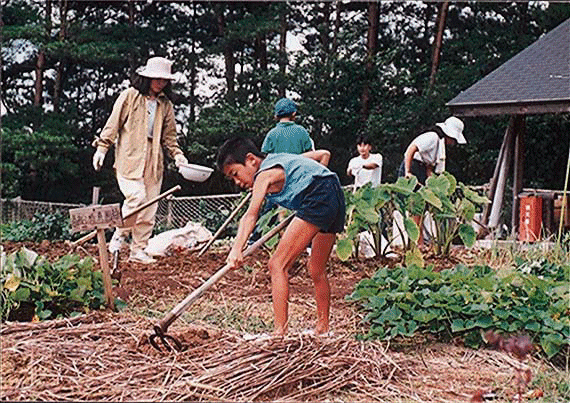| Home > Policy > White Paper, Notice, Announcement > White Paper > JAPANESE GOVERNMENT POLICIES IN EDUCATION, SCIENCE, SPORTS AND CULTURE 1996 > Priorities and Prospects for a Lifelong Learning Society Chapter 3 Section 3 3 | ||
Young people's character formation requires a rich mixture of structured learning in the school environment, interaction with adults and friends of different ages in the community, varied everyday-life and social experience, and an enriching experience of activities in a natural environment. Hands-on activities in the community are extremely significant in encouraging children to participate spontaneously and voluntarily, according to their own interests, concerns, and thinking.
Children who build up community experience on a foundation of school and home education are better equipped to acquire a wide range of qualities and abilities, including the social skills that enable people to work and live in communities, respect for the individuality of others, willingness to meet the new challenges that arise in everyday life, problem-solving skills, mental and physical strength, willingness to learn, and an interest in cultural activities and nature. In actuality, however, the educational function of communities is declining, and children's experience of everyday life and nature is seriously impoverished.
We need to create community environments that are desirable from the viewpoint of children's education. It is vital in this context that adults recognize their status as community members and work to build spiritually enriching and amenable communities by actively fulfilling their responsibilities, including participation in community activities.
As recommended by the fifteenth Central Council for Education's July 1996 report, priority should be given to the development of a "fourth sector" that will play a different role in community education from the traditional roles of schools, families, and communities. Under this concept, adults with the same aims, interests, and concerns will form links and contribute to children's development through activities.
Another priority is the promotion of community activities for children. The central and local governments can play an important role in this area by systematically developing venues and opportunities that enable children to participate in various hands-on activities, by offering information and advice on these activities, by training and pooling volunteers, and by providing support for the activities of youth organizations.
The five-day school week gives children more freedom and is expected to invigorate their out-of-school activities. Municipal boards of education can play an important role in encouraging children to participate in community activities. Boards of education are already working to provide children with venues and opportunities for activities. They have also expanded and enhanced various systems, including information access and support for youth organizations. Further progress in these areas requires the systematic development of structures for coordination and cooperation among local governments, community groups, schools, and other organizations.
Social education facilities and cultural and sports facilities in children's immediate environment, such as citizens' public halls, libraries, and museums, should be managed in ways that make them attractive to children as places where they can engage in independent learning activities according to their own interests and concerns. The most familiar elements of children's environments are school facilities. There should be increased efforts to improve access to these facilities as venues for children's activities on weekends and at other times.

| Back to Top | MEXT HOME |